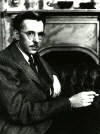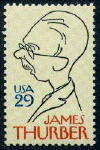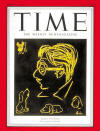|
James Thurber
 Few
authors have created a character so based upon their own lives as the
soft-spoken, slightly built James Thurber. Born on December
8, 1894, Thurber was an American writer and caricaturist of enormous
popularity. He was the best known of the residents of Columbus, Ohio,
the greatest American humorist since
Mark Twain. and he heavily influenced many writers of the day, including Kurt
Vonnegut Jr. and Joseph Heller. Few
authors have created a character so based upon their own lives as the
soft-spoken, slightly built James Thurber. Born on December
8, 1894, Thurber was an American writer and caricaturist of enormous
popularity. He was the best known of the residents of Columbus, Ohio,
the greatest American humorist since
Mark Twain. and he heavily influenced many writers of the day, including Kurt
Vonnegut Jr. and Joseph Heller.
Thurber's father, Charles, was a clerk and a minor
politician who often found himself unemployed. His mother, Mary, was a
strong-willed woman and a renowned practical joker. Once she stunned
guests by insisting that her husband kept her locked in the attic because of
her love for the postman. On another occasion, she pretended to be
crippled while attending a faith healer's revival. When the healer
pronounced the word of Jesus, she jumped up suddenly and shouted that she'd
been cured.
Thurber's father, who had visions of becoming an actor or a
lawyer, instead became the basis for the typically small, slight man of
many of Thurber's stories. The author portrayed his family in My Life and Hard
Times (1933). "I suppose that the high-water mark of my youth in
Columbus, Ohio," he wrote in the book, "was the night the bed fell on my
father."
 In 1927, Thurber met writer E. B. White, who introduced him
to Harold Ross, editor of a new magazine called The New Yorker. Ross
hired Thurber as an administrative editor. For the next two months,
Thurber worked feverishly, editing copy for all of the magazine's most
boring departments. He hated the job and began making mistakes on
purpose, hoping to get moved out of that position to take over "Talk of the
Town," the humor section. When that failed, he began submitting his
own pieces under a pseudonym. In 1927, Thurber met writer E. B. White, who introduced him
to Harold Ross, editor of a new magazine called The New Yorker. Ross
hired Thurber as an administrative editor. For the next two months,
Thurber worked feverishly, editing copy for all of the magazine's most
boring departments. He hated the job and began making mistakes on
purpose, hoping to get moved out of that position to take over "Talk of the
Town," the humor section. When that failed, he began submitting his
own pieces under a pseudonym. When Ross found out, he was
furious. After giving Thurber a strong tongue-lashing, he finally paused, look around,
and said, writers are "undependable...[but] if you're a writer, write!
Maybe you've got something to say." Thurber eventually became a staff writer,
sharing an office with E. B. White, and went on to write articles and draw
cartoons for The New Yorker for years.
He wrote and doodled constantly--at parties, at the dinner
table, in bed. E. B. White said, "His mind was never at rest, and his
pencil was connected to his mind by the best conductive tissue I have ever
seen in action."
 Between 1930 and 1961, Thurber published
nearly thirty books. He's one of few major American authors who wrote
almost exclusively short pieces. His best-known stories are The Catbird
Seat and The Secret Life of Walter Mitty about a man who fantasizes
compulsively. It was later turned into a movie starring Danny Kaye. Between 1930 and 1961, Thurber published
nearly thirty books. He's one of few major American authors who wrote
almost exclusively short pieces. His best-known stories are The Catbird
Seat and The Secret Life of Walter Mitty about a man who fantasizes
compulsively. It was later turned into a movie starring Danny Kaye.
Thurber often claimed he didn't care much about politics. He said that, when
Harding and Cox, who were both from Ohio, ran for president in 1920, he
couldn't decide who to vote for, so he flipped a coin. He never
bothered to see
how it landed, however, and left the room without voting.
 He
made fun of leftist intellectuals in the 1930s, saying, "I don't think the
revolution is here or anywhere near here." But in the Forties and
Fifties,
he became an outspoken critic of McCarthyism, after it began threatening
writers' freedoms. "The end of American comedy is in sight and
the theater's gone to hell," he said. "... Who can write where everybody's scared?
... I'm not letting any Congressman scare me to death." He wrote
diatribes against the House Un-American Activities Committee and spoke out
against it in newspapers and magazines. He
made fun of leftist intellectuals in the 1930s, saying, "I don't think the
revolution is here or anywhere near here." But in the Forties and
Fifties,
he became an outspoken critic of McCarthyism, after it began threatening
writers' freedoms. "The end of American comedy is in sight and
the theater's gone to hell," he said. "... Who can write where everybody's scared?
... I'm not letting any Congressman scare me to death." He wrote
diatribes against the House Un-American Activities Committee and spoke out
against it in newspapers and magazines.
In 1952, he
wrote, "I have to write what I have to write, and I don't give a damn what
anybody says about it. I wanted to be on the New Yorker, and I wanted to
make money, and I wanted to sell books. . . . The raising of my voice now,
at 57, is in defense of my livelihood rather than my profession."
Thurber also said, "Let us not look back to the past with anger, nor towards the
future with fear, but look around with awareness."
 James Thurber was married twice and had one daughter.
In later years, he lived with Helen Wismer, a magazine editor, at West
Cornwall, Connecticut. By then, he had developed extremely poor
eyesight, which made him seem terribly clumsy. He said, "I once tried
to feed a nut to a faucet, thinking it was a squirrel." He went
completely blind later in life, but he said, "At least, I have been spared
the sight of television." James Thurber was married twice and had one daughter.
In later years, he lived with Helen Wismer, a magazine editor, at West
Cornwall, Connecticut. By then, he had developed extremely poor
eyesight, which made him seem terribly clumsy. He said, "I once tried
to feed a nut to a faucet, thinking it was a squirrel." He went
completely blind later in life, but he said, "At least, I have been spared
the sight of television." In the twilight of his life, Thurber suffered
the effects of alcoholism and depression, but
his wife's devoted nursing enabled him to maintain his literary production.
In 1958, the editors of Punch magazine threw a luncheon in his honor
and called him the greatest living American humorist.
James Thurber died of a cerebral blood clot on November 2, 1961, in New
York.
 Discover James Thurber
at Amazon.com
Indulge
Yourself - Check Out Today's Best-Selling
Fiction -
Nonfiction -
DVDs |



 Between 1930 and 1961, Thurber published
nearly thirty books. He's one of few major American authors who wrote
almost exclusively short pieces. His best-known stories are The Catbird
Seat and The Secret Life of Walter Mitty about a man who fantasizes
compulsively. It was later turned into a movie starring Danny Kaye.
Between 1930 and 1961, Thurber published
nearly thirty books. He's one of few major American authors who wrote
almost exclusively short pieces. His best-known stories are The Catbird
Seat and The Secret Life of Walter Mitty about a man who fantasizes
compulsively. It was later turned into a movie starring Danny Kaye.


